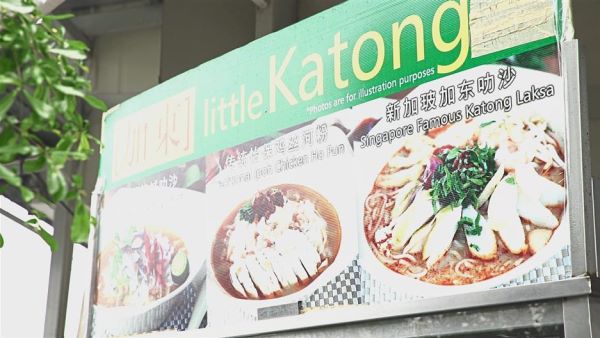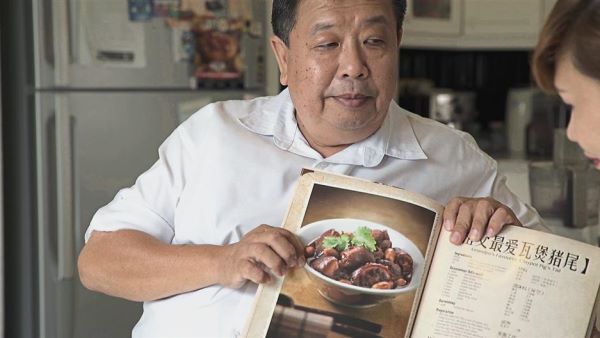- Joined
- Aug 29, 2008
- Messages
- 26,741
- Points
- 113
A 'Little Katong' in Ipoh: Cementing his place in the food business
Tan Ju-Eng
Thursday, Mar 23, 2017

Tan whipping up a bowl of delicious 'kai si hor fun'.
Photo: The Star
AFTER 20 years as an industrialist with Tasek Corporation Bhd, Datuk David Tan Sek Yin now spends his days over a hot stove making Ipoh kai si hor fun (shredded chicken kuey teow).
Dressed in his signature white long-sleeve shirt and black trousers, the 60-year-old can be seen going about Ipoh in his minivan delivering containers of special broth to his Little Katong stalls at Canning Garden, Gourmet Square hawker centre and Restoran Impressive@Little Genting.
The culinary world has always fascinated Tan, even though he had to play a big role in the cement business founded by his philanthropist grandfather Tan Lark Sye.
"I always like watching my mother and grandmother cook. I wanted to learn how they cooked, the method they used. It is not just about knowing what to cook," said Tan.
"People have wondered why I made the move to work in such a tiring business. But whenever I eat out and taste something good, I would research and try cooking to develop that special taste. I would not stop until I find it. It was exactly for this reason that I developed the broth for Ipoh kai si hor fun.
"I love kai si hor fun, and I could not find this taste that I had 30 years ago. The last time I had that taste was on Cowan Street (Jalan Raja Ekram). For five years, I tried to get it right. I tried using everything, shark bone, shark fin, scallops and all kinds of dried seafood to get the taste. I failed."

The Little Katong stalls sell kuey teow, Katong laksa and assam laksa.Photo: The Star
Exasperated, Tan went to the famous kai si hor fun stall, Thean Chun, in Ipoh old town. Day after day, he tried to wrangle the secret recipe from the old man who owned the stall.
Tan believed the old man's recipe was the only one that could produce that original flavour.
"He is really my sifu because he helped me to change direction in searching for that taste. But not without some provocation!
"I asked him: 'Sifu, how is it that your soup has that burnt smell?' Sifu got angry and took out a container of oil for me to smell. I took a sniff and told him that was exactly it. I asked him how he made it, he wouldn't reveal it.
"However, the taste was actually in the oil, and I started developing the oil instead of focusing on the soup. I have him to thank and will always consider him my sifu - even though he may not know it!"
Spurred by this new development, Tan spent long hours in his garage-turned-kitchen at his bungalow in Tiger Lane, experimenting until he got the taste he wanted. And so, Little Katong was born.
"In two years, I have opened three stalls, and a fourth is in the offing. The reason I didn't open restaurants or coffee shops is because I need to know the business and to build a name before committing to a bigger investment."
Besides kuey teow, Little Katong also sells Katong laksa, one of Tan's favourite noodle dishes from his childhood in Singapore, and the Penang assam laksa for variety.
"Now I sell about 400 to 500 bowls of noodles daily from the three stalls. What helps is also my ability to do proper costing, organise a system to increase productivity and reduce wastage of time and resources," said Tan.

Tan‘s book 'Lao Wei Dao' is dedicated to his grandfather, Tan Lark Sye.Photo: The Star
As business continued to grow, Tan knew he needed to have a production system. He bought a house in Canning Garden and turned it into a central kitchen with large metal canisters and fryers that use electricity and gas to cook broth and make sambal. The equipment operates by timers and according to Tan's standard operating procedure. His central kitchen looks like a mini factory.
"It's similar to when I was working in the cement industry. I have to manage workers and time, and costing and budgeting are the main factors.
"In the kitchen, I have to get the best equipment to save time. If I can save time, I don't need to use so much gas and electricity. The profit is hidden inside the cost," said Tan.
His main takeaway from the past two years is that his stall workers are among his most valuable assets.
"They need to have ownership of their work, and I need to earn their loyalty. If I want to be an active boss, I need to be able to do everything the worker does.
"On busy weekends, I also help to wash the bowls. When they see me doing that, they seem more willing to go the extra mile, to work harder."
Tan plans to open stalls in Singapore and Sabah. Also in the pipeline is expansion into Australia and the United Kingdom.
"There are a lot of students there from Malaysia and Singapore who would love a bowl of authentic kai si hor fun," he said.
Tan declared that he didn't get into the business for the money.
"I love cooking. I love to see people smile when they eat my food. That's the main thing. If people didn't like my food, I would have given this up a long time ago."
Before Little Katong was opened, Tan also wrote a recipe book, Lao Wei Dao (Old Tastes): A Trip Down Memory Lane, featuring signature dishes from the Tan family dedicated to his grandfather.
"Today, my customers say Little Katong's kai si hor fun is the best in Ipoh - even better than the original one!" he beamed.
Tan Ju-Eng
Thursday, Mar 23, 2017
Tan whipping up a bowl of delicious 'kai si hor fun'.
Photo: The Star
AFTER 20 years as an industrialist with Tasek Corporation Bhd, Datuk David Tan Sek Yin now spends his days over a hot stove making Ipoh kai si hor fun (shredded chicken kuey teow).
Dressed in his signature white long-sleeve shirt and black trousers, the 60-year-old can be seen going about Ipoh in his minivan delivering containers of special broth to his Little Katong stalls at Canning Garden, Gourmet Square hawker centre and Restoran Impressive@Little Genting.
The culinary world has always fascinated Tan, even though he had to play a big role in the cement business founded by his philanthropist grandfather Tan Lark Sye.
"I always like watching my mother and grandmother cook. I wanted to learn how they cooked, the method they used. It is not just about knowing what to cook," said Tan.
"People have wondered why I made the move to work in such a tiring business. But whenever I eat out and taste something good, I would research and try cooking to develop that special taste. I would not stop until I find it. It was exactly for this reason that I developed the broth for Ipoh kai si hor fun.
"I love kai si hor fun, and I could not find this taste that I had 30 years ago. The last time I had that taste was on Cowan Street (Jalan Raja Ekram). For five years, I tried to get it right. I tried using everything, shark bone, shark fin, scallops and all kinds of dried seafood to get the taste. I failed."

The Little Katong stalls sell kuey teow, Katong laksa and assam laksa.Photo: The Star
Exasperated, Tan went to the famous kai si hor fun stall, Thean Chun, in Ipoh old town. Day after day, he tried to wrangle the secret recipe from the old man who owned the stall.
Tan believed the old man's recipe was the only one that could produce that original flavour.
"He is really my sifu because he helped me to change direction in searching for that taste. But not without some provocation!
"I asked him: 'Sifu, how is it that your soup has that burnt smell?' Sifu got angry and took out a container of oil for me to smell. I took a sniff and told him that was exactly it. I asked him how he made it, he wouldn't reveal it.
"However, the taste was actually in the oil, and I started developing the oil instead of focusing on the soup. I have him to thank and will always consider him my sifu - even though he may not know it!"
Spurred by this new development, Tan spent long hours in his garage-turned-kitchen at his bungalow in Tiger Lane, experimenting until he got the taste he wanted. And so, Little Katong was born.
"In two years, I have opened three stalls, and a fourth is in the offing. The reason I didn't open restaurants or coffee shops is because I need to know the business and to build a name before committing to a bigger investment."
Besides kuey teow, Little Katong also sells Katong laksa, one of Tan's favourite noodle dishes from his childhood in Singapore, and the Penang assam laksa for variety.
"Now I sell about 400 to 500 bowls of noodles daily from the three stalls. What helps is also my ability to do proper costing, organise a system to increase productivity and reduce wastage of time and resources," said Tan.

Tan‘s book 'Lao Wei Dao' is dedicated to his grandfather, Tan Lark Sye.Photo: The Star
As business continued to grow, Tan knew he needed to have a production system. He bought a house in Canning Garden and turned it into a central kitchen with large metal canisters and fryers that use electricity and gas to cook broth and make sambal. The equipment operates by timers and according to Tan's standard operating procedure. His central kitchen looks like a mini factory.
"It's similar to when I was working in the cement industry. I have to manage workers and time, and costing and budgeting are the main factors.
"In the kitchen, I have to get the best equipment to save time. If I can save time, I don't need to use so much gas and electricity. The profit is hidden inside the cost," said Tan.
His main takeaway from the past two years is that his stall workers are among his most valuable assets.
"They need to have ownership of their work, and I need to earn their loyalty. If I want to be an active boss, I need to be able to do everything the worker does.
"On busy weekends, I also help to wash the bowls. When they see me doing that, they seem more willing to go the extra mile, to work harder."
Tan plans to open stalls in Singapore and Sabah. Also in the pipeline is expansion into Australia and the United Kingdom.
"There are a lot of students there from Malaysia and Singapore who would love a bowl of authentic kai si hor fun," he said.
Tan declared that he didn't get into the business for the money.
"I love cooking. I love to see people smile when they eat my food. That's the main thing. If people didn't like my food, I would have given this up a long time ago."
Before Little Katong was opened, Tan also wrote a recipe book, Lao Wei Dao (Old Tastes): A Trip Down Memory Lane, featuring signature dishes from the Tan family dedicated to his grandfather.
"Today, my customers say Little Katong's kai si hor fun is the best in Ipoh - even better than the original one!" he beamed.
